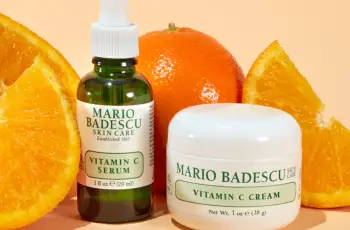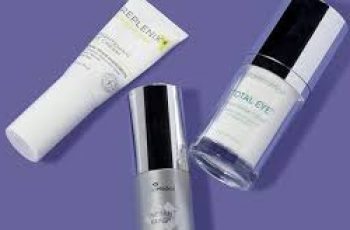
Sesame Oil in Skin Care
Sesame oil (Sesamum indicum) is a moisturizing, antioxidant rich oil found in many skin care products that has been used across the world for hundreds of years in food and medicine.
In skin care, sesame oil is sought after for its unique compounds like sesamol, an anti-inflammatory antioxidant, compound unique to sesame plants.
Sesame oil is also notable for its ability to absorb UV radiation, protecting the skin from sun damage when used in sunscreens.
Find out if sesame oil is right for your skin care routine!
What is sesame oil?
Sesame oil is primarily composed of unsaturated fatty acids, meaning it could be classified as a “dry oil.”
Though sesame oil is derived from plants, it is not considered an essential oil because its texture is too thick. Plant oils with high viscosity are often considered carrier oils.
Sesame oil is an unsaturated plant oil with hydrating, antioxidant, antimicrobial, and sun protective properties.
What are the active compounds?
Sesame oil contains many beneficial components like hydrating fatty acids and antioxidant natural compounds.
The four major fatty acids in sesame oil (in order of concentration) are:
Linoleic acid
Oleic acid
Palmitic acid
Stearic acid
The compound that sesame seed oil is most coveted for in skin care, however, is the lignan “sesamol,” not found in other plant species.
Sesamol is a very beneficial compound in skin care which has been lauded for its antioxidant and radiation absorbing properties since the 90’s.(2,3)
Some evidence even suggests sesamol may treat certain types of cancers. (4) That being said, more data is always required on proposed cancer treatments, and drinking sesame oil will not cure cancer.
Other lignans in sesame oil are sesamolin and sesamin. (11)
Sesame oil is also rich in tocopherols, the family of compounds which includes vitamin E.
Studies have also found that these and other active compounds such as various flavonoids and phenolic compounds give sesame oil antimicrobial properties. (12)
Benefits of sesame oil
Skin benefits
Sesame oil is rich in compounds that give it moisturizing, UV protecting, antioxidizing, and antimicrobial properties.
Studies have found it can treat bacterial and fungal conditions like staph infections. It has been used in places like Nigeria for centuries for antibacterial reasons. (5)
Antioxidant compounds present in sesame oil eliminate free radicals on the skin which contribute to wrinkles and aging skin. (3)
The hydrating fatty acids in sesame oil make it a good ingredient in many facial moisturizers.
It is also occlusive, meaning it helps other ingredients and moisture stay on the skin.
Oleic acid, also common in sesame oil, is useful when layering skin care ingredients because it helps other ingredients absorb into the skin.
Side effects
Sesame oil contains comedogenic Palmitic fatty acids, meaning it can clog the pores of your face or hairline if you are prone to acne.
Oleic acid, which sesame oil contains a lot of, can irritate extremely dry skin types, causing inflammation in some cases.
Is sesame oil safe in skin care?
Is it safe?
Sesame oil is safe to use in skin care.
EWG rating of “1,” meaning there are no common health concerns associated with sesame oil.
If you are allergy to sesame seeds in your food, you are likely also allergic to them as a skin care ingredient.
It is a clean, non-toxic ingredient, safe during pregnancy and on baby skin.
The primary danger of sesame oil is using it for incorrectly in your custom skin care regimen or if it’s not right for your Baumann Skin Type.
Take our skin type questionnaire to shop by your skin type!
Take the Quiz
Specific uses
Because sesame oil contains such a broad array of beneficial compounds, it is used in many types of skin care products like moisturizers, sunscreens, skin lightening products, and masks.
It is also used in formulations specifically designed to treat conditions like kinds of hyperpigmentation, dry skin, wrinkles, and hair follicle damage.
Studies have found that sesame oil, (specifically its active compound sesamol) is good at preventing photodamage from damaging UV radiation. (7)
Acne
Despite the seemingly boundless benefits of sesame oil, it is unfortunately not a great choice for acne treatments.
Sesame oil is comedogenic, in part due to palmitic acid, which means it can clog the pores of acne prone skin.
That being said, it does also contain antimicrobial properties which are often good for acne treatments.
If it was not comedogenic, it would be good for acne.
If you are acne prone but would like to include oils in your skin care regimen, here are six non-comedogenic oils to consider:
Avocado oil
Borage seed oil
Grapeseed oil
Mineral oils
Rose oil
Shea Butter
Dark spots
This oil has lots of oleic and linoleic acid, meaning it is a weak tyrosinase inhibitor and can prevent/treat dark spots.
Just like other natural plant-based tyrosinase inhibitors, they are only really effective when used alongside other skin lightening ingredients like PAR-2 blockers or other tyrosinase inhibitors like:
Arbutin
Hexylresorcinol
Licorice extract
Niacinamide
Retinol
Rose oil
There are many ways to treat hyperpigmentation, and many related products contain natural skin lightening oils.
Sesame oil for dry skin
Sesame oil for dry skin
Sesame oil contains tons of linoleic fatty acids and some hydrating saturated fatty acids like stearic and palmitic acid.
Linoleic fatty acids are soothing, anti-inflammatory, and great in barrier repair moisturizers.
Because it also contains a high concentration of oleic acid, it can be irritating to extremely dry skin types or skin conditions like eczema or psoriasis.
Stearic and palmitic acids are also both extremely hydrating and great in many moisturizers.
Hair care
Sesame oil is rich in hydrating fatty acids as well as the valuable compound sesamol, which is a potent anti-inflammatory and antioxidant ingredient.
Sesame oil can be great for repairing damaged follicles or protecting hair from sun damage.
Moisturizing hair follicles is an important part of healthy hair growth if you have a dry scalp.
If your skin is susceptible to acne, be cautious to avoid getting sesame oil on your hair line; it can result in acne on the forehead.
Five other great hair oils are:
Avocado oil
Almond oil
Argan oil
Jojoba oil
Tea tree oil
UV protection
Sesame oil has demonstrated remarkable UV protective qualities in studies.(1)
Sesame oil is a good ingredient for sunscreens because it directly protects the skin from sun damage by absorbing UV radiation.
Because it is such a safe, sustainable, and affordable ingredient, it can be found in many sunscreens or SPF skin products.
Which products contain sesame seed oil?
Here is our complete collection of skin care products with sesame oil! Be sure to take the Baumann Skin Type quiz to make sure sesame oil is right for your skin!


